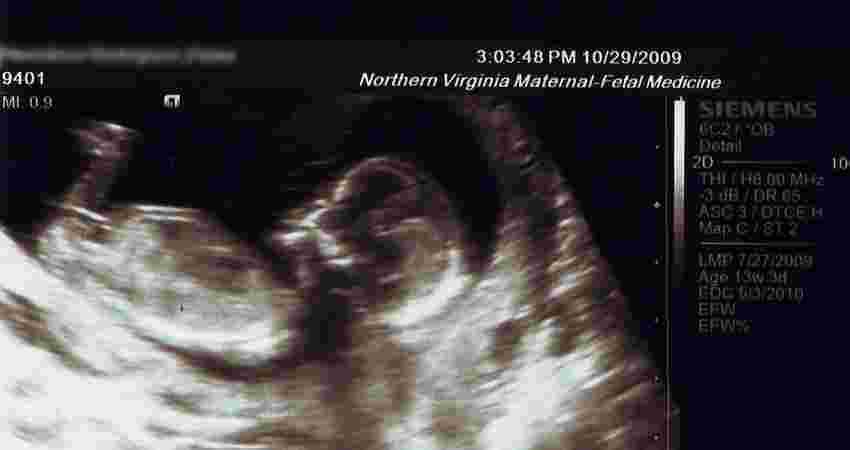
Life Begins at the Beginning
Scientific facts on when life begins

We can approach abortion from many perspectives: Biological, embryological, genetic, philosophical, social and economic, at the very least. As for the first three – my approach as a scientist, physician, surgeon, and simply someone who finished medical school, is factual.
Life starts at conception
There is no more pivotal moment in the subsequent growth and development of a human being than when 23 chromosomes of the father join with 23 chromosomes of the mother to form a unique, 46-chromosomed individual, with a gender, who had previously simply not existed. Period. No debate.
There is no more appropriate moment to begin calling a human "human" than the moment of fertilization. And don't let anyone tell you otherwise, because it would be a degradation of factual embryology to say it would be any other moment. For example, some pro-abortion zealots and even, shockingly, some disingenuous physicians claim it is the moment of primitive notochord formation (nonsense!) or, even more absurdly, the moment of implantation. (It defies sanity to claim that the implantation of a developing blastocyst onto a uterine wall defines humanity more than does the completion of an entirely new DNA map, which defines a new organism's existence).
“Size” does not determine humanity
And to say that "size" is a determinant of humanity, of course, is an unscientific reason to deny an embryo his or her human status. In any event, it is an embryological reality, which no embryology textbook on earth denies, that at the moment of fertilization a new human being is formed.
Some people claim that our human lives really do not begin at fertilization, and that a more realistic time for the dignity of "humanity" to be imparted on a growing blastocyst-embryo would be about a week after fertilization, about the time of implantation.
Perhaps even more dangerous is the concept that it is not a precise moment, but a gradation of human worth. With this model, a preborn baby at 3 months is somewhat of a human being, but a newborn is more of a human being.
It is not “potential to become a person” that entitles a human embryo to legal and moral status. It is part of the fabric of natural and biological law that the human embryo’s actuality of being human entitles him or her to legal and moral status. 1
What embryologists say
Every human embryologist worldwide states that the life of the new individual human being begins at fertilization. No human embryologist has ever described human life as "potential" human life. Thus, killing the embryo -- by harvesting embryonic stem cells, by using abortifacient contraceptives, by committing so-called therapeutic cloning, or by flushing spare in-vitro fertilization embryos down the sink -- takes that human life.
The majority of input in discussions of early human embryonic life often comes from philosophers, politicians, theologians, and the biotechnology industry, yet human embryologists are the most qualified to scientifically respond to the crucial questions at hand. But all too often they are glaringly omitted from the discussion. The developmental geneticist Jerome Lejeune (1926-1994), discoverer of the chromosomal basis for Down’s Syndrome, stated:
"…each of us has a unique beginning, the moment of conception … As soon as the 23 chromosomes carried by the sperm encounter the 23 chromosomes carried by the ovum, the whole information necessary and sufficient to spell out all the characteristics of the new being is gathered … a new human being is defined which has never occurred before and will never occur again … [it] is not just simply a non-descript cell, or a ‘population’ or loose ‘collection’ of cells, but a very specialized individual …" 2
Dr. Kischer, emeritus professor of Anatomy at the University of Arizona, writes, "…the first thing learned in human embryology [is] that the life of the new individual human being begins at fertilization (conception)." 3 He continues, "we should respect a microscopic human embryo because at that time it is an integrated whole organism, just as the human is at every moment in time until death. Every human embryo deserves as much respect as you or I because it is formed as a new individual human life within the continuum of life …" To deny this, Kischer says, is "a trivialization and corruption of the science of human embryology."
And textbooks after textbooks of human embryology agree. The embryology textbook The Developing Human: Clinically Oriented Embryology, 6th ed., by Moore et al., 1998, notes that so-called emergency contraceptive pills (i.e., "morning-after pills") “prevent implantation, not fertilization. Consequently, they should not be called contraceptive pills … Because the term abortion refers to a premature stoppage of a pregnancy, the term ‘abortion’ could be applied to such an early termination of pregnancy." It further states, "The intricate process by which a baby develops from a single cell is miraculous … A zygote is the beginning of a new human being." Bruce Carlson’s 1994 textbook Human Embryology and Developmental Biology states, "Human pregnancy begins with the fusion of an egg and sperm … Finally, the fertilized egg, now properly called an embryo, must make its way into the uterus.
”The official U.S. Public Health Service Policy defines abortion as follows: "All the measures which impair the viability of the zygote anytime between the instant of fertilization and the completion of labor constitute, in the strict sense, procedures for inducing abortion." 4
Unscientific claims
Scientific rigor does not always correlate with the convenience of an industry or the convenience of society. It takes an appalling rejection of science and biology to deny the humanity of the human embryo.
In the January 2002 issue of Scientific American, a board of outside ethicists assembled by Advanced Cell Technology posited that, “At the blastocyst stage, when the organism is typically disaggregated [destroyed] to create an embryonic stem cell line, it is a ball of cells no bigger than the period at the end of this sentence." So, then, size is a determinant of humanity? Not very scientific!
In fact, from a biological and embryological standpoint, that statement is utterly inane and drenched in absurdity. True, there is an apparent difference between a baby and a microscopic cluster of undifferentiated cells. But, indeed, over time in any individual, all the qualities of life change: their size, form, function, and appearance. We can reduce any point in time in an individual’s development to a trivial value by comparing that point to any other reference point we might choose.
It is a mere pop-culture form of science -- or philosophy, or theology -- swaying in the breeze, which justifies itself with public opinion instead of with rigorous scientific reasoning.
Such man-made determinations of when human life begins are arbitrary, nebulous, and self-serving. They are devoid of critical science and biological reality. The philosophy of the primitive streak or embryonic implantation as somehow imparting humanity was championed in the 1970's by some philosophers and theologians, but since then it has been completely discredited from an embryological and biological standpoint.
Actual human beings, not “potential”
There is no point from fertilization until death when, biologically, the human nature of that human being is altered. That human being continuously creates specifically human enzymes and, once formed, is on a path to grow and develop in the natural course of human growth. All he or she needs is nutrition and a warm place to grow. To say that an embryo has the "potential" to become a human being is biologically and technically imprecise – and dangerous.
The bottom line is that in terms of biology and human embryology, a human being begins immediately at fertilization and after that, there is no point along the continuous line of human embryogenesis where only a "potential" human being can be posited. Any philosophical, legal, or political conclusion cannot escape this objective scientific fact.
Strict adherence to science alone will preclude denial of personhood to the unique creation -- the human being -- constructed at fertilization, and public policy should reflect this.
The Church and science agree
The Catholic Church has spoken definitively on when human embryos are to be respected as human beings – i.e., from the moment of fertilization. And medical oaths ranging from Hippocrates to the Geneva Declaration of Physicians concur wholeheartedly.
Why would anyone want to tamper with this, philosophically, theologically, medically, or politically, at the risk of their eternal souls, let alone of the lives of hundreds of millions of preborn human beings?

1. Baumgartner F. "Human embryos: potential humans?" Science 296:1967-8; 2002
2. Lejeune J. A symphony of the preborn child: part 2. Hagerstown, MD: NAACP; 1989. [
3. Kischer CW. Let’s be factual about the human embryo. http://www.all.org/abac/ab020128.htm
4. Public Health Service Leaflet no. 1066, US Dept of Health, Education, and Welfare, 1963, 27.

